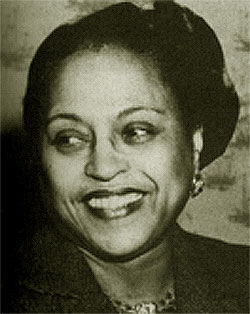On October 13, 1898, Edith Sampson was born in Pittsburgh, the first black woman elected judge to a municipal court. She was born Edith Spurlock, one of seven children.
Her father, Louis Spurlock, earned $75 per month as a shipping clerk in a cleaning, pressing, and dyeing business. Her mother, Elizabeth Spurlock, worked at home making buckram hat frames and twisting switches of false hair.
Edith graduated from Peabody High School, and three years later married Rufus Sampson, a field agent for the Tuskegee Institute. She also attended the New York School of Social Work. There, one of her instructors was George W. Kirchwey, also a professor at Columbia University Law School. After distinguishing herself in his criminology class, he told her she had the talent to be a lawyer.
In 1927, Sampson was the first woman to receive a law degree from Loyola University. Although Sampson found that many of her male colleagues, particularly white men, were “exceedingly cool” to her, she also found that judges would often bend over backwards to compensate for this churlishness.
In terms of her courtroom manner, in her own words, she said, “I talk from my heart and let the law take care of itself.” In 1947, Sampson was appointed to serve as an assistant state’s attorney in Cook County. By that time, she was affiliated with a number of organizations, including the Women’s Progressive Committee (she served as its president), the Chicago Professional Women’s Club (president), the Afro-World Fellowship (also its president), the South Side Boy’s Club, the South Side Community Center, the NAACP, the League of Women Voters, the Chicago Urban League, and the National Council of Negro Women (she chaired its executive committee).
Sampson also was the first black woman named delegate to the United Nations (1950 to 1953). In 1962, at an age where most people would probably retire, Sampson sought election as a judge on the Chicago Municipal Court. As a Democrat in Chicago at that time and as a friend of Mayor Richard Daley, she had no difficulty in being elected. Mrs. Sampson retired from the bench in 1978. The following year, in 1979, she died.
